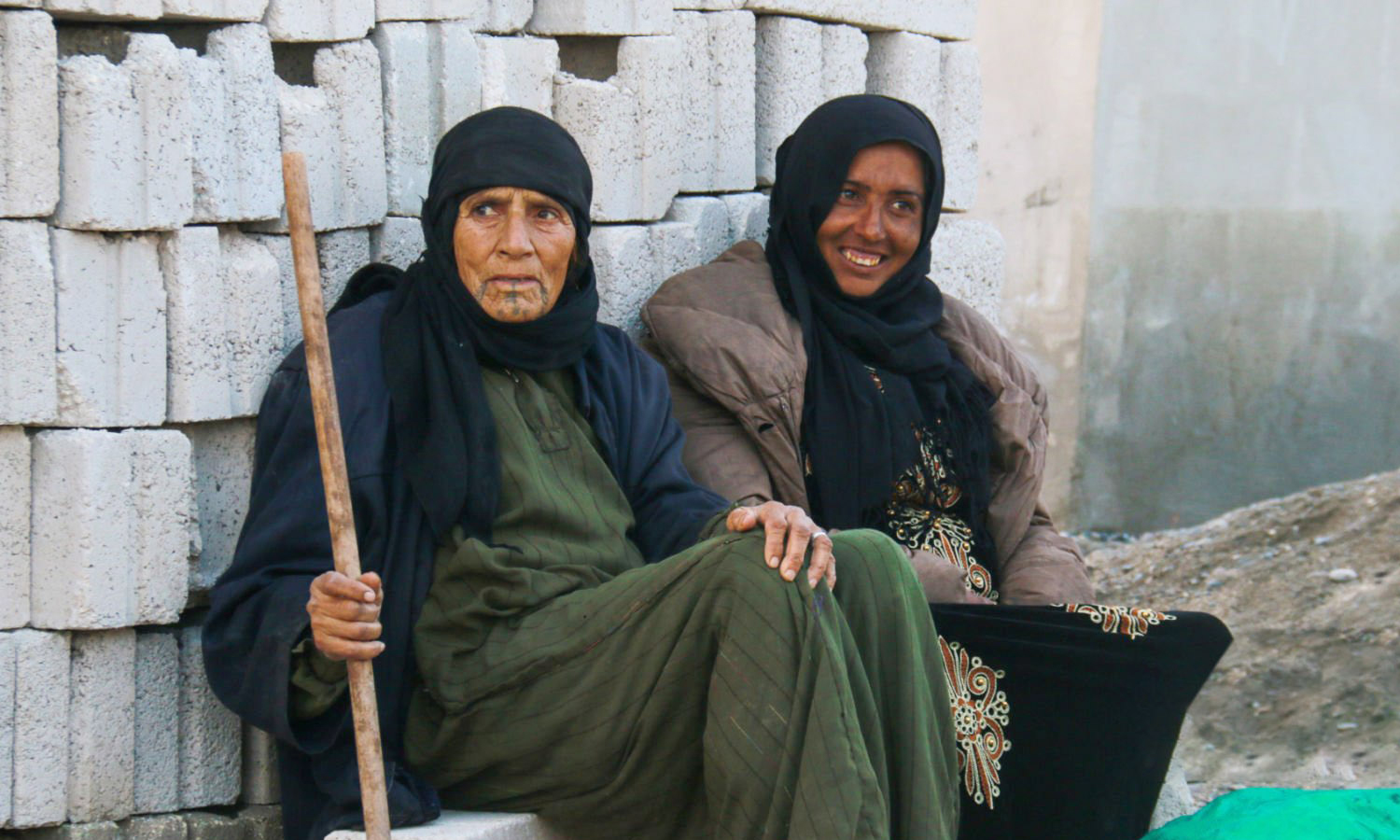



Idlib – Hadia al-Mansour
The 60-year-old Umm Mohammed lives with her widowed daughter and three grandchildren under a raggy tent, unable to repel the summer heat or the winter cold in the Harbanoush camp in the northwestern Idlib region.
She feels helpless without a breadwinner under difficult circumstances in which no one turns around to help them or alleviate their pain.
Umm Mohammed and her family fled the western countryside of Aleppo during the long years of war. Now the only joy she can provide to her grandchildren is storytelling, such tales filled with longing and nostalgia for days gone by, according to what she told Enab Baladi.
“Life is tragic and unbearable here; poverty has swept everything; how can two weak women manage their affairs here in this forgotten and abandoned camp without any support or breadwinner,” says Umm Mohammed.
Adding that many widows, people with disabilities, and the poor are rarely able to secure their basic needs, and even medicine for blood pressure and diabetes are no longer obtained after the cessation of free medical support in the camp.
The elderly women in Idlib and the IDP camps are considered the most vulnerable and affected by the loss after 11 years of war that left them with pain that can only be consoled by the end of the war and their return to their hometowns from which they were displaced.
Among them, Khadija al-Ayoubi, in her sixties, who hid her tears when she started talking about her miserable condition in the Deir Hassan camps on the Turkish border.
Al-Ayoubi believes that death is a relief to escape from the miserable life in the camp.
“We live here on the margins of life, waiting for death, which has become much better than the life we live here without care, without attention, fighting poverty and disease in these cold camps, an exile into which this war has placed us mercilessly,” she told Enab Baladi.
Al-Ayoubi lost two of her sons in the war, her husband died of an incurable disease, and she rarely finds anyone to help her secure the requirements of her life after she lost her loved ones who she always thought she would find in her old age.
She added, “Only in Syria do fathers bury their children, and parents live bemoaning the youth of their children who bid farewell to life before they lived it.”
Leaning on her stick, the elderly woman tries to collect as many nylon bags, sticks and waste as she can from the dumpsite near the camp every day.
She wants to light it in the evening so she can get warm in the evening when the cold creeps into her weak body, and her fireplace finds nothing but what it gathers to give some heat inside the dark tent.
Elderly women in Idlib and northwest Syria lack psychological, social, and health care, especially with the outbreak of the Covid-19 pandemic, which claimed the lives of many of them, and there are scarcely homes for elderly women in the region, amidst the suffering of the vast majority of them from chronic diseases and difficulty in securing medicines.
On the other side, Hayat Abdulaziz, 65, finds relief and comfort in her daily meeting with the elderly women of Atmeh camp. Such meetings turned into an outlet for her sadness, loneliness, and psychological pressures and to forget her difficult reality in the IDP camps.
Abdulaziz lives with her orphaned grandson, without support or breadwinner, trying to secure the expenses of the child whose parents were killed in the bombing of their town of al-Fatira, by working in handmade woolen textiles and from the relief aid she receives.
“The war may have brought exceptional effects on us, the elderly, as a result of our weakness and poverty, but we console each other through social solidarity here in the camp. We try to instill hope and help each other, even if with some attention and kind words,” Abdulaziz said.
No up-to-date official statistics are available on the number of elderly people in Syria, but the latest estimates indicate that the number exceeded 1.7 million, with an estimated rate of 7.2 percent of the population, and the number is expected to reach 5.7 million in 2050, about 13 percent of the Syrian population.
if you think the article contain wrong information or you have additional details Send Correction